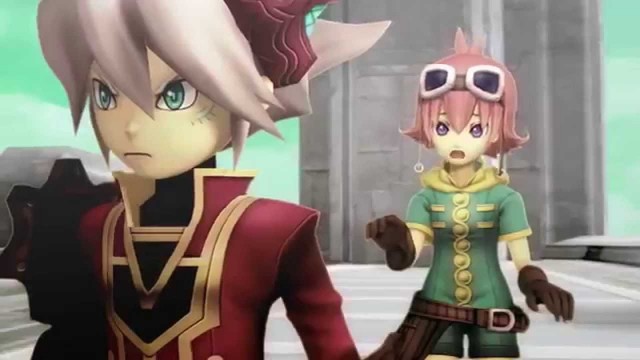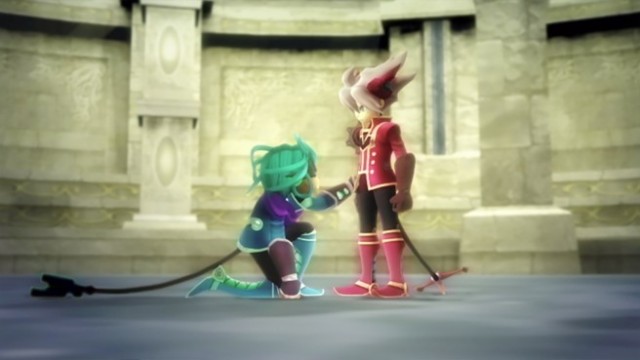Flying and combat are a blast when they work; Rodea and his world are visually interesting; Story is straightforward but entertaining
Grating characterizations and voice acting; Mechanical flaws, including a rage-inducing camera
Rodea the Sky Soldier is the latest creation from the mind of Yuji Naka, the father of Sonic the Hedgehog. Though the game launched in November of 2015, its development has roots as far back as 2010. At the time, Wii was in its prime, with the system shifting millions of units and drawing a variety of developers and titles to it as a result. Naka developed Rodea with the intent of utilizing Wii’s pioneering motion controls, envisioning a game that could be controlled with the Wii Remote exclusively. After a number of setbacks and delays, Rodea went from being a Wii-exclusive to multiplatform– Wii, Wii U, and 3DS. All three versions of the game are being published by NIS America and are essentially identical, with the main exceptions being the controls and graphics. We’re starting with the handheld Rodea first, and will eventually branch off to cover the remaining two.
So is Rodea worth the hype and wait? As far as the 3DS version goes, it’s a mixed bag. Visually, the game is no stunner. Muddy textures abound, with the graphics largely looking washed out and sketchy. It’s not ugly by any means, but these are some bland visuals on a system that is capable of so much more. The presentation isn’t entirely underwhelming, though, as the cut scenes are fairly impressive, and the hand drawn stills that accompany the remaining cinematics are also quite handsome. Rodea himself is a robotic soldier who has sworn to protect the kingdom of Garuda from the evil Naga Empire. He falls in battle, landing in a desert for 1,000 years until he’s discovered by an inventor named Ion who reactivates Rodea, just in time for (you guessed it) the return of the Naga who are once again trying to takeover Garuda.

The story is compelling enough, including the mystery behind Rodea’s real, live heart, but Naka just can’t resist veering into the cornball narrative beats that have hampered Sonic the Hedgehog for the past fifteen years or so. Rodea is little more than a clone of Shadow the Hedgehog, and while I do enjoy Sonic’s dark doppelganger, the characterization here falls flat. Ion, Rodea’s rescuer and pilot of the ship that gets the robot from point A to B, is a shrill, obnoxious version of Tails; she can be so ridiculously chatty and cheesy during gameplay that there’s actually an option to minimize how much she speaks. Considering the game completely revolves around the duo, it’s unfortunate that Naka couldn’t make the two more interesting to be around.
The gameplay is at least serviceable, though it’s inconsistent. The central mechanical hook of Rodea is the character’s ability to fly (he’s a Sky Soldier, after all). When it works, the sensation is fast and freeing, which is to be expected from the man who helped bring NiGHTS Into Dreams to the world. Where it falls short is the clunky execution. A tap of the jump button sends Rodea into the air; the player then aims a targeting reticule where he wants Rodea to fly to, and another tap of the jump button sends the automaton soaring there. Most of the time. Rodea will only travel towards solid objects, so it’s impossible to send him shooting straight up into the sky or into the oblivion of clouds littered throughout the adventure. This wouldn’t be too big of a deal if the game world wasn’t largely composed of series of floating chunks of rock and pillars. It can be a huge pain manipulating Rodea into reaching some destinations because often targets are too far in the distance to lock onto, or the camera will refuse to reposition itself so that the next sky island is in proper view.

Still, Rodea‘s flight more often than not is workable, and along with the glory of barreling through the air, Naka’s team included segments where the action goes on-rails, with Rodea making mesmerizing corkscrews through the air, or sliding along zip cords hanging upside down with his long tail. Later upgrades make it easier to keep Rodea in the sky, too, but whether most players will ever get to that point before throwing in the towel is another question entirely. Combat is another component of Rodea‘s gameplay, but it suffers from much the same sloppy implementation as flying. Rodea uses the same mechanics for getting into the air when going into battle, but then goes on to task players with hitting the attack button, which turns the character into something like a heat-seeking missile. Unfortunately, the game often becomes befuddled when multiple inputs are being entered, which when joined with the shoddy camera, results in fights spent mindlessly alternating between tapping jump and attack, and harriedly repositioning the view using the L and R buttons.
Like flying, when the combat system works, it can be a joy to send Rodea tearing through bad guys. Some enemies are enormous, and create a great sense of satisfaction when turned into dust. That’s Rodea in a nutshell, though; it’s fun when it works. I wouldn’t say it was a mistake to bring Rodea to 3DS, but the game is so rough that it either needed more time in development, or the handheld was incapable of fully handling Naka’s vision. For fans of the creator’s previous works and players who enjoy 3D adventure titles, Rodea is worth a look, but be prepared to fight with it in order to get any enjoyment out of the game. With a rebellious camera, hit-or-miss mechanics, and some nauseating voice acting and dialogue, Rodea is lucky that its moments of brilliant execution help save it from absolute mediocrity. I genuinely hope that Naka gets to bring another game starring this character and the world he created, but only if the mistakes made with this inaugural effort are corrected.
Nintendojo was provided a copy of this game for review by a third party, though that does not affect our recommendation. For every review, Nintendojo uses a standard criteria.




 ShareThis
ShareThis






